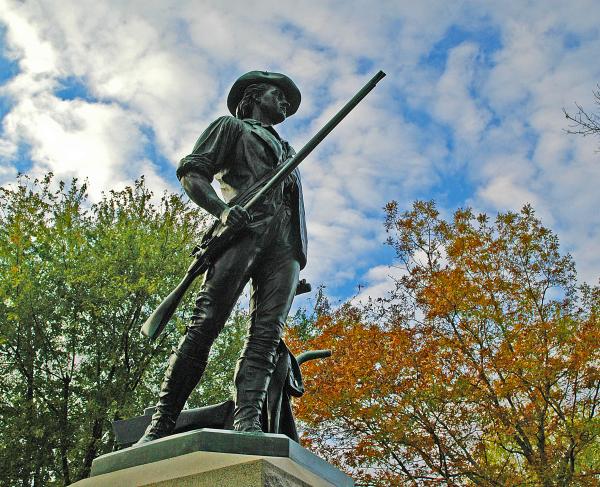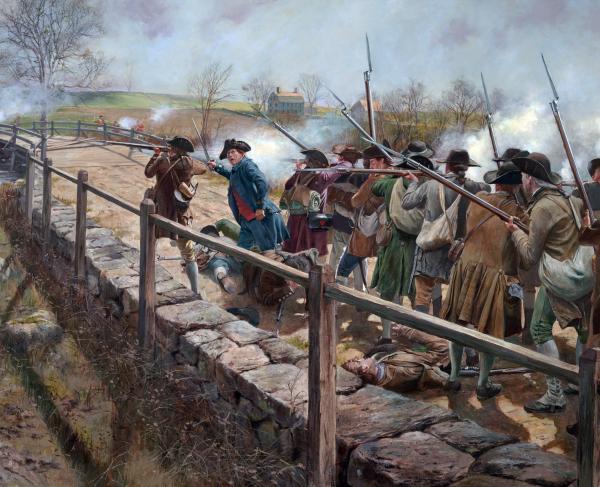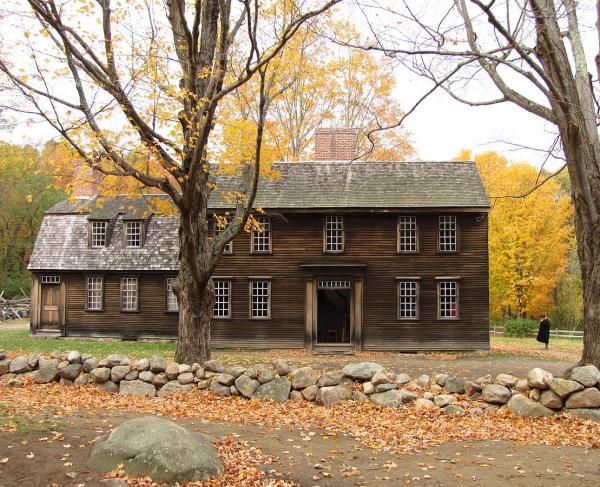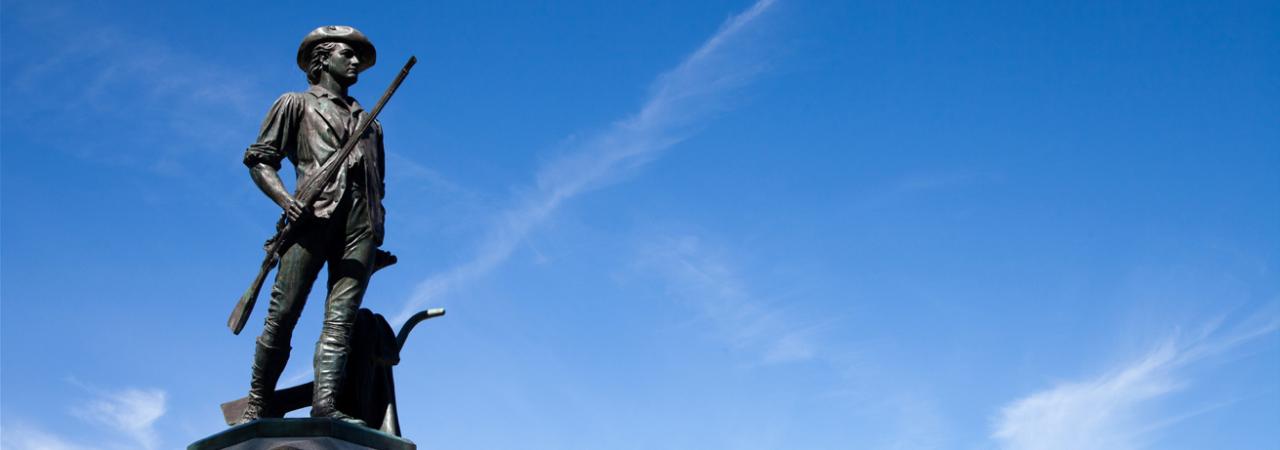
The Minute Men statue by Daniel Chester French, reputedly based on Isaac Davis.
The town of Acton, Massachusetts, is located six miles west of Concord. In 1775, it was a small rural farming community in Middlesex County. Shortly after the British Parliament revoked the provincial charter of Massachusetts, Acton organized a Minuteman Company. Many other similar towns did the same. In typical New England fashion, in a nascent form of democracy, members of the company elected Isaac Davis, a popular 30-year-old gunsmith, as Captain. The ranks of the company swelled as tension with the British in Boston continued to smolder. Luther Blanchard, the company’s fifer, learned to play a tune called “The White Cockade,” a throwback to Scottish opposition to the English crown.
The Minutemen trained in Davis’s backyard for six months. While they made bayonets and cartridge boxes and practiced their aim, the First Continental Congress declared a boycott on British goods. Patrick Henry’s cry of “Give me liberty, or give me death!” echoed throughout the colonies. By April 1775, Isaac Davis’s company of farmers had become a well-trained, well-armed militia, just as tensions with the British were reaching the breaking point.
On April 18, 1775, Lucy Bosmer, a young woman of Concord, set down a few words in her diary:
I really don’t have time to spare from our household chores to write in this Journal–and yet, I must, to calm my nerves and enable me to think clearly about these perilous times. This I must surely do to help my husband, Joseph Hosmer, our four children, and our dear village of Concord. No shots have yet been fired but already we are a wartime community…Last night Joseph and I drove by ox team two wagon loads of ammunition from Acton to hide on Deacon Jonathan Hosmer’s farm there. His twenty-year-old son, Abner, is Joseph’s third cousin and an Acton Minuteman.
In the wee hours of the morning of April 19, 1775, three gunshots cracked the cool air. It was the pre-arranged alarm of the Acton Minutemen. Soon other shots reverberated across Acton. By 5:30 am, the Minutemen were converging on the home of Captain Davis. Among them were company musician Abner Hosmer, Lucy’s 21-year-old cousin, and James Hayward, a 25-year-old schoolmaster and one of Davis’ oldest friends. Upon arrival, the men received news that a British column was marching towards Concord. Hayward put his bayonet to the grindstone and was heard to remark, “I expect we’ll come to a push by nightfall and I want my bayonet sharp.”
A half hour later, with Davis at the head of the column, Abner Hosmer beating a cadence on the drum, and Luther Blanchard piping away on his fife, the 37 Acton Minutemen moved out headed towards Concord. Davis left behind his wife Hannah and four children. Sixty years later, Hannah recalled,
The alarm was given early in the morning, and my husband lost no time in making ready to go to Concord. My husband said little that morning. He seemed serious and thoughtful; but never seemed to hesitate as to the course of his duty. As he led the company from the house, he turned himself round… He said only ‘take good care of the children.
By 9:00 am, nearly 400 Minutemen from around the area were gathering in the designated Muster Field not far from Col. James Barrett’s farm on the outskirts of Concord. A council of war was held. By now, rumors were swiftly moving about a fight that had broken out earlier that morning in nearby Lexington between British regulars and Capt. John Parker’s Lexington Minuteman company. Intelligence was spreading that the British were coming to Concord to gather weapons, powder, and hidden in various places around the town.
From the bluffs overlooking the North Bridge over the Concord River, the Acton Minutemen could see smoke curling from downtown Concord. Near the bridge was a squad of British grenadiers attempting to pull up the planks to keep the Minute Men out of Concord. The Minute Men, now under the overall command of Col. Barrett, decided to attack.
Barrett asked Davis if his company would take the lead and Davis replied, “I haven’t a man who is afraid to go.” To the sound of fife and drum, the Acton Minutemen marched down the hill and into history. At the approach of the militia, the British on the bridge retreated to the south side and formed into battle line. British skirmishers took aim with their accurate rifles. The fife and drum swelled, the sound of martial music and clanking equipment filling the ears of the Minutemen. The sun was bright and warm and the grass was green and speckled with flowers.
One rifle shot rang out, and then two more. Blanchard’s fife fell silent as a British bullet grazed his arm. The Acton men continued forward, drawing into the agonizingly close range of effective musketry, as Hosmer’s drum continued to beat cadence. As Davis and his men neared the foot of the bridge, the British main line prepared to fire. The Acton Minutemen tensed and braced, but kept marching forward, drawing to within 50 yards of their foe.
The British line erupted in smoke and flame. Isaac Davis was shot through the heart and killed instantly. Hosmer tumbled down with a mortal wound as well. There was no more music. Maj. John Buttrick rushed to the head of the militia and cried out, “Fire, fellow soldiers, for God’s sake, fire!”
The Minutemen returned fire as one. The months of target practice in the Davis backyard paid off—16 British soldiers were killed and wounded by the volley. The British fled back to town. While the bodies of Davis and Hosmer were gently picked up and carried up the hill, James Hayward surged forward with the other enraged Minutemen to do battle.
The British retreat continued towards Boston. Hayward joined men from other companies as they harassed the British column. Just west of Lexington was the Fiske Farm. Hayward stopped to get a drink from the well. Emerging from the house was a British soldier who informed Hayward that he was “a dead man.” Hayward replied, “And so are you.” Both men raised their muskets and fired. The British soldier died on the spot. Hayward sustained a wound that pierced his powder horn, entering his side. He lingered until the next morning, then died. Like Davis and Hosmer, Hayward’s body was returned to Acton for burial.
On April 19, 1875, for the Centennial of the fight, with President Ulysses S. Grant and a large crowd in attendance, a statue of a Minuteman, reputedly based on Davis, was erected on the spot where he fell one hundred years earlier. That sculpture has become an American icon. Local lore tells that the sculptor, Daniel Chester French, modeled the plow for his composition on Davis’s plow, which can still be seen in the entrance to Acton’s Town Hall just across the street from the monument over Davis's grave.
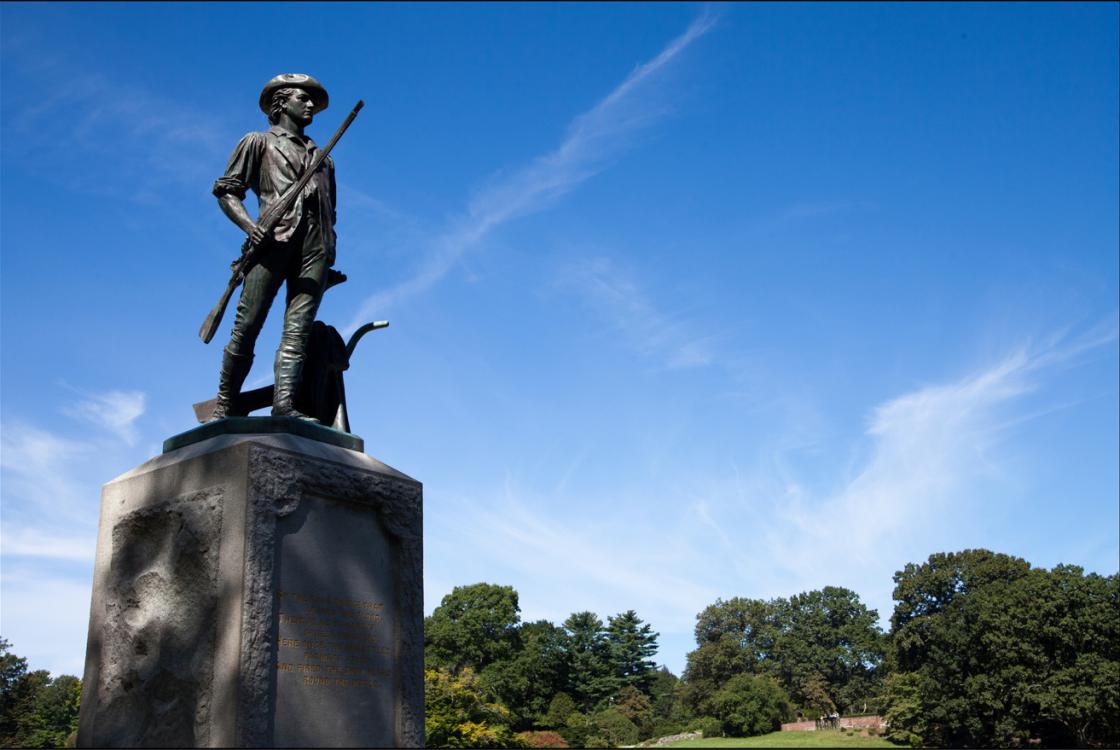
In 1959, Acton’s Chapter of the Daughters of the American Revolution organized a plan to preserve Davis’ six mile line of march to Concord. Two years earlier, based on local historical research, Acton Boy Scouts had begun to recreate the April 19 march. In 1963, the Acton Minutemen, a ceremonial reenactment company, was formed. On every April 19 since then (Patriot’s Day in Massachusetts), they gather, along with Boy Scout troops and others, before dawn, at the Davis Homestead, which still stands. From there they proceed to Concord, retracing the trail first walked in 1775.
Participants who retrace the Isaac Davis Trail on Patriot’s Day receive from the Acton Historical Society a parchment scroll that recognizes their participation. On it is a map of the route, an image of the Minuteman Statue, and an image of a painting done in 1894 of Davis and his men marching away from his homestead, the original of which hangs in the town’s library.
In an ironic twist of fate, 86 years later to the day, April 19, 1861 the 6th Massachusetts Volunteer Militia, which consisted of men from Acton, sustained casualties during an encounter with a pro-secessionist mob. The regiment was proceeding through Baltimore, Maryland, transferring from one railway station to another as they responded to President Abraham Lincoln’s initial call for volunteers to put down the rebellion started by the firing on Fort Sumter.
Related Battles
93
300
